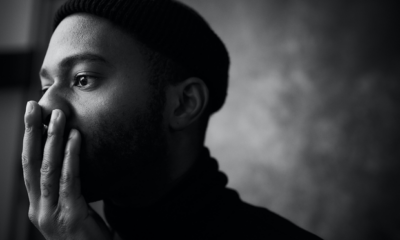Life
3 Ways to Stay Strong and Push Through When Hardships Arise

We all have trials and tribulations, and most times they are out of our control. I believe that’s why it can be so frustrating when trouble arises, because we feel powerless. But this isn’t true! How we perceive these times gives us power, and will ultimately dictate the quality of our lives.
Each event can have many interpretations. You can ask two people about a situation they both went through, and sometimes you’ll get two completely different answers! Most times this isn’t because one was being truthful and the other wasn’t, but because of how they perceived the events that took place.
That’s how powerful perceptions are, so why not use this power to our benefit? Instead of thinking on what was lost, think of what there is to gain. When you think positively, it helps you from not feeling stuck, and helps you look towards the future.
Below are three things to consider whenever a hardship comes your way:
1. This is an opportunity for me to grow
Viewing troubling times as an opportunity to improve and grow will give you a sense of freedom and happiness because you’ve decided to lead your life, as opposed to just accepting your life. Some people just accept the things that happen to them/around them. When you have this mindset, you are telling yourself there is nothing you can do in that situation, and you are giving away your power.
This will affect not only your mood, but also the people around you, especially if you’re a leader. They feed off your energy and body language. When you focus on growth, you can think more clearly on solutions, which is what you want. It’s ok to feel sad, frustrated, or confused. If you want to be successful, you will feel all of these, and quite often. When you do, recognize what your feeling, but don’t feed it. If you do, it will grow.
“If you don’t design your own life plan, chances are you’ll fall into someone else’s plan. And guess what they have planned for you? Not much.” – Jim Rohn
2. Don’t focus on the problem, find the solution
This sounds pretty simple but how many of us focus more energy on the problem and why it happened or who did it, instead of trying to focus immediately on the solution? I learned this in the military. If something goes wrong, my superiors were less concerned with who did it and more concerned with finding a solution to the problem, and as quickly as possible.
But I was once guilty of this thinking, and sometimes I slip back into that mode of thinking when my emotions are strong. Changing your mindset to focus on solutions will give you a sense of power, which will calm you, because you feel in control. This in turn, will help you think clearly and rationally, as opposed to emotionally. Furthermore, being in a more relaxed state of mind will allow you to absorb information more clearly so you can learn from the incident and become a better you.
3. Determine how the hardship improves your character
What was being tested during your hardship? Patience? Empathy? Communication? Understanding? Endurance? I remember working for a boss I did not like. He seemed to pick on me, and I couldn’t understand it. I went above and beyond what was asked of me, but people were still being promoted quicker than I was.
To give a little depth on my perception at the time, I was born and raised in Brooklyn NY. Not poor, but close to it. So respect is something that is valued greatly in neighborhoods I come from, because we don’t have much else. Respect was your money, and could get you things money couldn’t buy.
Now everyone wants respect, but me, I need it that much more. So when I felt he wasn’t giving me respect, I almost convinced myself to handle these matters. Imagine the people you train, passing you by and you know their work ethic doesn’t match yours. It sucked.
I talked to my dad, who always gives great council, and he told me it wouldn’t be wise. He told me to look for ways to grow, and I did. And let me tell you, during that time I learned things that cannot be taught in classrooms because you can only be learned through experience. My endurance was really challenged, but made me wiser and stronger, which made me better equipped to deal with future troubles I’d have. Because of those lessons, I was able to teach others about my experience and give wise counsel.
“Lead a life of your own design, on your own terms. Not one that others or the environment have scripted for you.” – Tony Robbins
When those times come, ask yourself where you’re weak and what you can you do to improve on that weakness. Finding something you’re not good at should make you happy, because it gives you a chance to improve! If you suck at something, do something about it! Don’t wallow in self-pity. It’s not a fruitful exercise.
When hardships come your way, your perception is a powerful weapon that you must manipulate, don’t let it manipulate you. Ask yourself how can this help you grow, what positive opportunity is hidden in the hardship and focus on the solution, not the problem. Doing these things will put the power back in your court. Give it a shot, it changed my life!
How do you keep your head up high when hardships arise? Share your thoughts and advice down below!
Life
Why Moving to a New City Can Change Your Mindset
Discover how moving to a new city boosts neuroplasticity, builds resilience, and reshapes your mindset

Relocation is always a challenge. Rebuilding and restarting your life requires you to step outside of your comfort zone. (more…)
Change Your Mindset
The Hidden Reason You Can’t Stay Consistent
If motivation keeps failing you, the real issue isn’t discipline. It’s the identity shaping your habits and long-term success.

Success often looks like a time-management problem. You buy a planner, set reminders, and hope that next week will be different. For a few days, it works. Then stress hits, motivation drops, and old patterns return. (more…)
Did You Know
How Skilled Migrants Are Building Successful Careers After Moving Countries
Behind every successful skilled migrant career is a mix of resilience, strategy, and navigating systems built for locals.

Moving to a new country for work is exciting, but it can also be unnerving. Skilled migrants leave behind familiar systems, networks, and support to pursue better job opportunities and a better future for their families. (more…)
-

 Business3 weeks ago
Business3 weeks agoHow Smart Brands Use Instagram Data to Outperform Competitors
-

 Business4 weeks ago
Business4 weeks agoThe Paradox of Modern Work: Can Tech Make Us More Human?
-

 Change Your Mindset3 weeks ago
Change Your Mindset3 weeks agoThe Hidden Reason You Can’t Stay Consistent
-

 Change Your Mindset3 weeks ago
Change Your Mindset3 weeks agoThe Real Psychology Behind Quitting Too Soon
-

 Entrepreneurs2 weeks ago
Entrepreneurs2 weeks agoThe Six Pillars That Ground Purpose-Driven Leadership (The Berenyi Life Blueprint)
-

 Business3 weeks ago
Business3 weeks agoHow AI Agents Can Quietly Expose Your Business to Serious Risk
-

 Business2 weeks ago
Business2 weeks agoDIY vs Delegate: The Real Reason You’re Burned Out
-

 Business3 weeks ago
Business3 weeks ago9 Modern Workplace Solutions That Instantly Boost Productivity


























2 Comments